Fr. Bob, as he is fondly known, is a member of the Roman Catholic Order of Friars Minor (Franciscans). He came to western Canada in the 1970s, and lived and worked first at St. Michael’s Retreat Centre near Lumsden, Saskatchewan, and then, since 1995, at the Mount St. Francis Retreat Centre in Cochrane, Alberta near Calgary. Fr. Bob will be turning 90 in 2020. He continues to be very active in serving others, as a popular preacher of retreats, as well as a beloved counsellor and Spiritual Director. He has also written four books of poetry: Pause Awhile: Poems for Reflection; Music of the Heart; Moments of Faith: Vision Embraced; and Reflective Moments: Pause to Meditate. We were delighted to sit down and chat with Fr. Bob about the ups and downs of his colourful life, and how, while in his 40s, he came to be a Fransciscan Friar and embrace a way of simplicity and love.
Here are some audio highlights from our conversation, with thanks to Dexter Britain for sharing his music. (2:42)
Interview by Laura and Bill Locke
Kolbe Times: Fr. Bob, can you tell us a little bit about your early life?
Fr. Bob: I was born in North Bay, Ontario in 1930, and lived there during my early childhood with my father and mother. I also had five siblings – four of whom are still alive today, ranging from 82 years of age to 95. I was educated in the separate Catholic school system until grade six, when my parents moved to Parry Sound, Ontario, and where my father was a system paymaster for D l L Industries, which was a wartime industry. I later went to the University of Western Ontario, and then studied at the University of Toronto to become a specialist in Special Education. I worked in that field of education for many years in the public education system.
Also, in my late teens, I joined a religious order, called The Congregation of the Resurrection. It was a German order, and I was with them for three years. It was during my third year with them that my father had a massive stroke and was no longer able to work. One of us children had to go home to become the breadwinner. My mother, by the way, was crippled all of her life. She walked with two crutches. Her right leg never matured; it was just hanging there. So the question was, who was going to go home to help them? Well, my oldest sister was married, and my next sister had already become a nun. My oldest brother was in his last year before ordination, and then I was next. I was the least farthest along in my chosen life, so I decided to go home.
I remained there for 20 years, teaching in the public school system and looking after my parents – and also looking after my younger siblings until they were completely educated the way the rest of us were. Near the end of 1970, after both my parents had died, I decided to resign from my teaching job and go back to religious life…and that’s when I came west and joined the Franciscans.
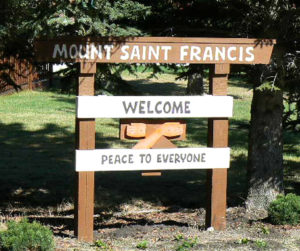 Kolbe Times: What drew you to the Franciscan path of life?
Kolbe Times: What drew you to the Franciscan path of life?
Fr. Bob: Well, after I resigned from my teaching job, I chose not to go back to the order that I had left earlier, The Congregation of the Resurrection. They were diminishing quite rapidly. I spoke to my pastor, and he said, “I’ll give you an address for some Franciscan Friars in western Canada. I think that would be your best choice.” So I wrote a letter to the community out here, and even though I was over-age – I was in my 40s – they said, “Come, give it a try.” So I came west…and I’m still here. I didn’t know any of the people out here when I arrived, and I didn’t know anything about the Franciscan Order either. But I knew a lot about St. Francis.
Kolbe Times: That sounds like quite an adventure! And I guess you must have liked what you found, since you’re still here.
Fr. Bob: Yes. I think the thing that really attracted me is the simplicity of the way of life. And you can’t really live simply without living humbly, because the truth of yourself is always before your eyes, you know, always looking and seeing. If I want to walk in the footprints of Christ and Francis, then I can’t be all that important in the eyes of the world. I simply have to be important in the eyes of God. That’s what I seek every day – is try to be “little” before the Father.
Kolbe Times: St. Francis recognized that Christ chose a poor and humble life, so he chose to live that way as well. I guess both St. Francis and St. Clare were emulating Christ’s simplicity and poverty.
Fr. Bob: Yes. As a matter of fact, both Francis and Clare, in their own particular and unique ways, had entered so fully into the life of Christ that they really were walking in His footprints, as they advise us to do. Clare especially had a great love for Christ in terms of poverty – and poverty then became the centre of her walk. She fought for it all her religious life. And it was only on her deathbed that she received the Papal Bull – a decree issued by the Pope – that gave the Poor Clare Sisters the right to live in extreme poverty.
Kolbe Times: You’ve also spoken about how Jesus connected simplicity with being childlike.
Fr. Bob: Indeed. Jesus was a son – a child – of the Father, and therein resides his childlikeness. We sometimes forget this. He was begotten by the Father before all time, but nevertheless He was a son. And in that sonship, Jesus was always obedient to his Father’s will, which is love – and Jesus invites us to walk that same path. Jesus said that we must change and become like a little child if we want to enter the Kingdom of God. A little child is full of trust and wonder, and a child’s world is simple. St. Francis, in following Jesus’ example, also connected simplicity with childlikeness, with littleness, and with humility.
That reminds me of a little story told by Francis himself. Francis’ first meeting with Pope Innocent II illustrates that element of childlikeness. The Pope rather flippantly suggested that Francis, in his tattered and worn habit, should roll in the mud with the pigs. Francis was not insulted at all, but willingly obeyed, with abandon and joy. It was Francis’ childlike humility and obedience that won the heart of the Pope.
Kolbe Times: What a great story. What would you say are some other attributes of “childlikeness”?
Fr. Bob: When we look at a child who is just learning to walk, and you put your arms out to that child, he or she will do everything they can in order to get to where your hands are. They have total trust that everything is going to be alright. Sometimes a child will go up to a perfect stranger and look up and smile and want to be picked up. It’s beautiful! And this is how childlikeness can look in a believer, as our heavenly Father stretches out His arms, wanting to draw us to Himself.
We can also say that a child lives a simple life. They very simply trust that their needs will be met. And when their trust is rewarded with love and kindness, then they bloom! When those things are not present, we end up with big problems as the child matures – physically, mentally, and spiritually. But that littleness, that trust, that simplicity, that willingness to be taught, are signs of a positive, healthy childhood. And because we are children of God, that’s exactly the way we need to come before Him – and very simply ask for His help.
Kolbe Times: When you mention a ‘willingness to be taught’, that reminds me of something that Richard Rohr has written about: having ‘a beginner’s mind’.
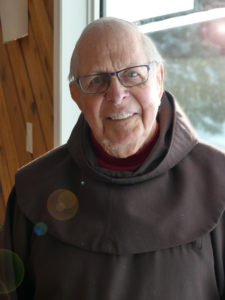 Fr. Bob: Yes. That’s about how, as adults, we can still keep that attitude of a beginner and a learner. Have I lost the curiosity or the mischievousness of my childhood? As I’ve aged, have I been able to retain that childlikeness, and yet have a maturity that allows me to do whatever it is I have decided to do? I remember speaking with Richard Rohr about that one time when he was here visiting us, and we had a very interesting dialogue. I’m very interested in childlikeness in adults, because it always stands out. How we laugh, how we cry, and how we treat one another is basically based on how we learned to do those things as a child, not as an adult – because it has to grow; it has to grow like everything else, like the mentality that has to grow so that we arrive at maturity, whatever that is.
Fr. Bob: Yes. That’s about how, as adults, we can still keep that attitude of a beginner and a learner. Have I lost the curiosity or the mischievousness of my childhood? As I’ve aged, have I been able to retain that childlikeness, and yet have a maturity that allows me to do whatever it is I have decided to do? I remember speaking with Richard Rohr about that one time when he was here visiting us, and we had a very interesting dialogue. I’m very interested in childlikeness in adults, because it always stands out. How we laugh, how we cry, and how we treat one another is basically based on how we learned to do those things as a child, not as an adult – because it has to grow; it has to grow like everything else, like the mentality that has to grow so that we arrive at maturity, whatever that is.
Kolbe Times: As a longtime Spiritual Director, you must see a lot of people who, because of their way of thinking or maybe some things that happened in their lives, have lost that childlikeness and trust.
Fr. Bob: Very much so. I think in our modern society, very few people really see any necessity to retain childlike qualities. But when you do meet someone who has, you can’t help but fall in love with them – because they are being who they really are, and who they always have been. They bring their childlikeness and their maturity together. They’re complete.
Everyone I meet in my Spiritual Direction work is so unique! But there are a number of things that I look for. First and foremost, why would a person ask to come for spiritual direction? What is the motivation behind that request? Is it simply to prove something to themselves? Is it from a desire to ask questions and learn? Do they really want to share their life’s journey with someone, and be guided spiritually along that path? Or what might be other reasons that people come for spiritual direction? But I have encountered wonderful, wonderful people in this work that I do every day.
Kolbe Times: And I’m sure you must meet people with a lot of hurt and pain in their past.
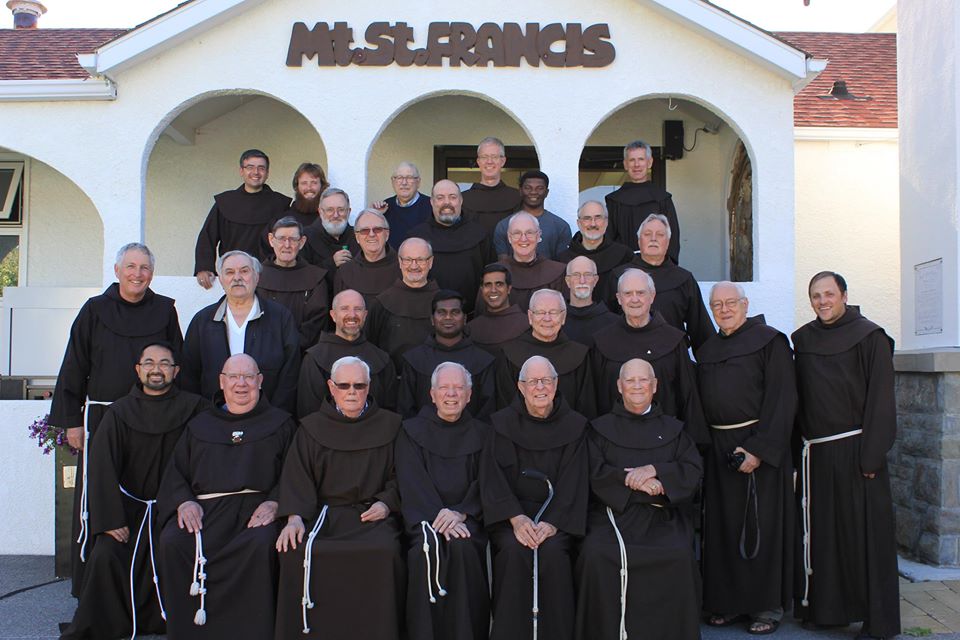
Fr. Bob: Yes. Very often they want their story to be made known, at least to another human being, and they know that this is a safe place because it’s all confidential. Confidentiality is so important. They are sharing the deepest part of their own being when they’re coming to see a Spiritual Director regularly. One of the interesting things that I’ve noticed in my work is that I see many more Protestants than I do Catholics. And these are not only lay people. I meet regularly with many Protestant ministers and pastors – Lutherans, Baptists, Anglicans, and from the United Church. In terms of Catholics, I have a number of Catholic lay men and women, but I have only two Catholic priests. It’s rather amazing to me. I’ve also had people from other faith traditions come to me over the years for Spiritual Direction. Right now I only have two – one is a Hindu lady who comes and wants to talk about Jesus because she thinks he’s the most beautiful person she’s ever heard about. And I have a Muslim man who has recently moved to Vancouver, so now he phones and we do Spiritual Direction over the phone. It’s really delightful.
Kolbe Times: And in the simplicity and childlikeness of St. Francis’s way of living, you also see a link with what you call one of our modern world’s greatest problems – materialism.
Fr. Bob: Yes. As we already mentioned, Francis felt that simplicity was closely tied to Gospel poverty. In fact, he saw poverty as a helpful discipline to guide his inner attitude of simplicity. A key concept here is “sharing”. Our world at this particular time in history, by and large, is not a sharing world. Where we see this most of all is not so much in the lives of ordinary people. Where I see it standing out very profoundly is in the large international businesses. They have one design, and it is twofold: money and power. They claim that they give back a lot of money. But where do they give that money? In many cases, they give it to governments and large institutions, and by doing that, these huge corporations end up having a large amount of control over our governments. It’s happening here in North America, and in many other countries around the world.
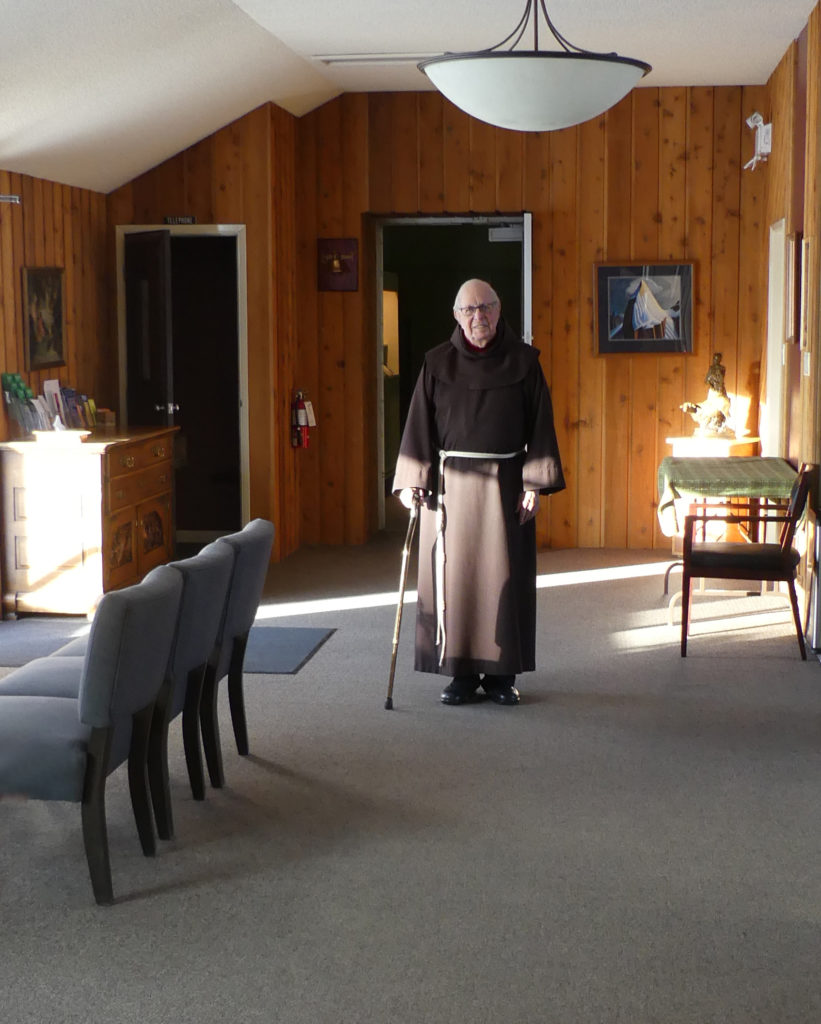
That’s how I connect this whole issue of materialism with living a life of avowed poverty – which is very different from living in poverty. If you live under a vow of poverty, as we Friars here do, it means you don’t “own” anything – but everything is supplied. We don’t go hungry. We don’t go thirsty. We always have something to wear. We have a roof over our heads. It’s just that none of it is ours. And because obedience is the sister of love, we do whatever is required of us, because we love what we are, in terms of being members of the Franciscan Order, which is the Order of the Little One. As it was for Francis and Clare, so for us…we attempt to purify our hearts from the tendency and yearning for possession and power, enabling us to be little, and to live simply, helping one another. Every one of us can strive for that.
We also hear about how the rich are getting so much richer, and there is such a huge gap between the rich and the poor. It’s shocking for me to read the statistics about all the people living on the streets right here in Calgary – thousands of them – not to mention over 100,000 people living under the poverty level. How can that be, in our prosperous western society? Well, it’s all linked to materialism. It has crept into every aspect of our life, and it’s taken over. This materialistic consumerism has a devastatingly negative effect on everyone in our world – on the few who possess much, and on the many who do not possess even their basic needs. It’s become too easy to turn a blind eye to the needs around us. And that’s not so much a criticism as it is just a statement of fact.
Kolbe Times: It seems to me that there is such freedom in living in simplicity, and not becoming overly-attached to “things”, or to our reputations.
Fr. Bob: Very much so. Actually, the outgrowth of poverty and humility is tremendous freedom. That’s the goal. And that’s wonderful because many people in our world today are not free, even within themselves. They’re bonded to something or they’re shackled to something – and yet God created each one of us free. We’re invited to live in that freedom of God. To experience that liberating interior spirit of simplicity will affect how we live – sometimes very dramatically!
I remember watching a movie a long time ago about a nun whose brother had given her a pen before he went off to war, and that little pen became everything to her. She couldn’t and wouldn’t give it up…and it got in the way of her spiritual growth. So we can even find ourselves shackled to something small like that. Simplicity is both a grace and a discipline, and nobody said it was going to be easy. Simplicity does not just fall on our heads. It is about making a conscious choice – and that involves both group and individual life. We would all do well to remember the timeless words of Gandhi: “Live simply so that others may simply live.” God calls us to place Him at the very centre of our minds and hearts, and trust that everything else, He will add. We don’t have to grasp at things.
Kolbe Times: Besides grace and discipline, I think living a life of simplicity also requires wisdom. So how can we grow in wisdom?
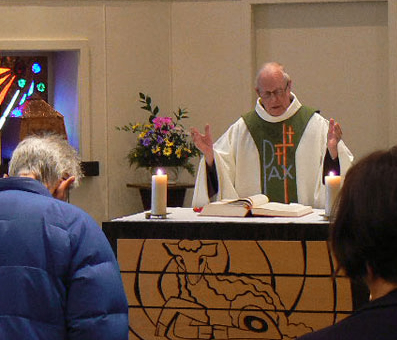
Fr. Bob: For me, wisdom is an actual gift from God. Basically, we receive wisdom when we ask for it, which means that we have to pray. And we ask the Holy Spirit to be present to us, to infiltrate us with the Spirit’s own wisdom, because the Holy Spirit is wisdom itself. Like everything else in the spiritual realm, this is not something that happens overnight. It’s like physical growth. It just takes time. If we consistently ask for the gift of wisdom, it comes. It comes naturally…and we may not even notice it. But other people will notice it! They might say, “Oh, she is such a wise woman. Did you hear what she said?”
Kolbe Times: It occurs to me that children gain so much knowledge in their early years because of their openness and curiosity and humility. It all works together. If we’re not humble – if we think we know everything already – we are no longer curious and open, and we miss out on learning new things.
Fr. Bob: That’s very true. And as I said, it’s a gradual thing. We don’t suddenly become wise. Some people attain wisdom at an earlier age than others. Someone might be 70 years old before they realize that they have received the gift of wisdom. And sometimes a person might be given wisdom in their 20s, simply because they have been open to receiving it. There are many wise people walking the face of the earth today – they’re just not listened to very often. That’s the problem.
Kolbe Times: I think I’m speaking with a wise person right now.
Fr. Bob: Well, I kind of wonder about that from time to time. But I do thank God for allowing my life to unfold the way it has. It hasn’t always been an easy life. There have been some pretty hard decisions and difficult situations. Thankfully, I’ve always received the grace to do what I thought was best…especially when I gave up my religious vocation to go home and care for my parents and younger siblings, because I wasn’t really prepared for that. I thought my life was already established. I had joined a religious order. I was going to be a teacher. Well, I was still able to be a teacher, but I had to step away from my life with The Congregation of the Resurrection. And at first, I found that quite difficult, but God’s grace and peace were there for me. My family, you know, was a poor family. We didn’t have much in the way of material goods. I often think of the struggle my mother had to make ends meet, and having to walk with crutches all her life. And yet, she did everything that other mothers did. She was a magnificent example for us children.
So it was all God’s plan. I may not have seen it that way right at the time, but in looking back over my life, everything seems to fit into a pattern that I didn’t develop. So it has to have been developed by God. And if I have ever failed to respond to that pattern, that’s not God’s fault. That’s my own human weakness. And that has occurred, too – where I’ve kind of argued with Him and said, “Well, I don’t understand why you’re doing this, at this particular time.” And He listened.
Kolbe Times: God is so patient with us.
Fr. Bob: Yes, indeed – and very loving. I’ve come to realize how very much I am loved by God.
Kolbe Times: Thank you for sharing your story, and sharing some of the lessons you’ve learned in your almost-90 years on this planet. It’s been lovely spending time with you.
Fr. Bob: It’s been a great pleasure for me, as well.
SACRED SIGNS
by Robert Mitchell, OFM
(From Reflective Moments: Pause to Meditate)
The prophet Isaiah reminds us:
all life is sacramental;
everyone and everything is touched calls forth God’s Presence.
smoke is not just smoke,
clouds are not just clouds,
fire is not just flame,
bread is not just food,
work is not just something we do,
all are signs
more and more and more
and I? and you?
Can we see the sacredness beneath these signs?
To find out more about upcoming special events and the various types of retreats offered at Mount St. Francis Retreat Centre, visit www.mountstfrancis.ca


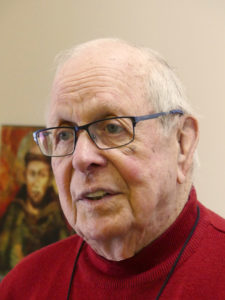







What a beautiful life story.
We met during a pilgrimage to the Holy Land. I will never forget you. The Masses, the confession in the beautiful chapel, our sight-seeing tours, your calming disposition.
I have retired after working for Sts. Martha and
Mary church for 20 yrs.
You will always be in my heart and I will pray for you always.
Respectfully, Barbara Bruno